#i better not see anyone taking bettys agency away from her she is. my girl. she CHOSE to do this WHOLE THING
Explore tagged Tumblr posts
Text
what i love about betty tho is that she goes all in and that's like, one of her main character things, right??? ANNNNDD ok so like. the show doesn't really BLAME simon for not noticing that too- which i appreciate cuz like how are you supposed to just Be Aware when someone is totally obsessed with you like. It can be pretty easy to miss especially if you're in a loving relationship with them- their devotion might just seem like how they show their love, right??
SO IT'S LIKE. IT'S partially on betty for just being that way and partially on simon for not noticing and not really either of their faults cause HOW COULD THEY HAVE KNOWN and they dont regret it BUT IT COULD'VE BEEN BETTER ANDDDDD. GOD I LOVE FICTION. aaaaahhhhhhGGGHHH.
#nnstuff#rambling#i better not see anyone taking bettys agency away from her she is. my girl. she CHOSE to do this WHOLE THING#shes insane. she loves her fail husband. in tears over this you have no idea.#ok back to homework#fionna and cake#adventure time#betty grof#using fake tragedy to distract me from my real world pain rn you guys have no idea
80 notes
·
View notes
Text
Marvel Cinematic Universe: The Incredible Hulk (2008)
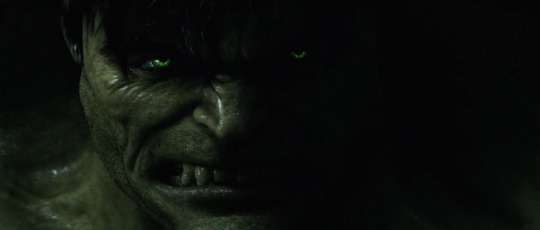
Does it pass the Bechdel Test?
No.
How many female characters (with names and lines) are there?
Two (20% of cast).
How many male characters (with names and lines) are there?
Eight.
Positive Content Rating:
Three.
General Film Quality:
Not as bad as everyone seems to remember, but also, not good.
MORE INFO (and potential spoilers) UNDER THE CUT:
Passing the Bechdel:
Martina barely has lines to start with, and she’s not even in the same country as Betty, so...no.

Female characters:
Martina.
Betty Ross.
Male characters:
Bruce Banner.
General Ross.
Joe.
Emil Blonsky.
Stanley.
Jim Wilson.
Samuel Sterns.
Tony Stark.
OTHER NOTES:
Bruce sees a bunch of guys harrassing Martina, and he almost walks away to avoid a conflict that could set off the Hulk, but then he thinks better of it and comes back to confront the guys and save the girl. It’s a shorthand way of showing the audience that Bruce is a good guy, not letting his own fear get in the way of doing the right thing, blah blah. I support that message, obviously, but I do wish they wouldn’t use ‘woman in jeopardy’ as their go-to method for proving something about a man. Martina only exists in the film for this purpose, she’s just a pretty prop so Bruce can prove his morals, and that’s not cool. Female characters existing only as props is not cool, and violence against women being used to demonstrate/further a man’s story isn’t cool either. Get a better lazy shorthand, movie.
Lou Ferrigno cameo is clearly the highlight of the whole film.
At least 60% of Betty’s lines are just her saying ‘Bruce’ with different intonations, usually as a question. “Bruce?” she whispers. “Bruce?!” she calls. “BRUCE!!!” she screams. She also almost definitely yells it in slow motion with the sound cut out during dramatic climactic points in action scenes. I don’t know, I didn’t think to take note of that.
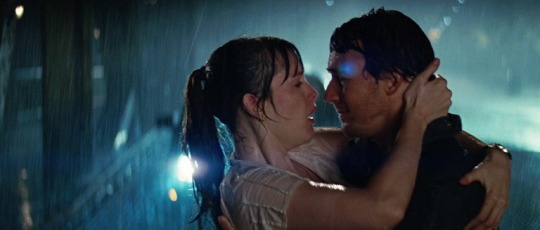
Oh. This movie. It might be the first of the MCU films I ever saw, back before they had committed to the idea of actually doing a Cinematic Universe, so it was just ‘a Hulk film’ that I watched, filed as ‘bad’ in my brain, and never revisited again, even after the MCU got going in earnest and - years later - I got sucked into the vortex and wound up watching and re-watching all the movies in order. It’s easy to leave this film out of the chronology (and many people do); despite a totally pointless scene with Tony Stark at the end of the movie, it doesn’t actually tie in to the rest of the MCU in any meaningful way, and as an intro to the Hulk it isn’t really necessary: firstly, because most people who don’t live under rocks already know who the Hulk is from popular culture, and secondly, for anyone else, they get a perfectly serviceable introduction to him in his next film appearance (The Avengers), in which the role has been recast with Mark Ruffalo, who plays Bruce Banner/Hulk in every future MCU film and leaves this Edward Norton vehicle as a weird outlier better forgotten than incorporated into one’s understanding of the character. Edward Norton is a fantastic actor who has done so much great work over the years, but this was not a good role for him, and having rewatched this movie now nearly a decade after seeing it the first time, I’ll probably go back to giving it a miss whenever I trawl through the MCU. It’s a film with, basically, nothing to offer, neither as a standalone nor as part of a wider franchise. That’s a pretty sad indictment, but there it is.

Is this the worst film in the MCU pantheon to date? Probably. Not absolutely - I think the door remains open for debate (the other contenders for the title, we’ll get to in due time). The thing is, this movie is not as bad as history remembers it: most of it is actually fairly decent. Not remarkable, not impressive, but decent in the sense that it is stock-standard playing to expectation, it isn’t making any negative waves, it’s just there. The bad rep this movie has is owed almost exclusively to the way it ends, with an embarassing and meaningless Hulk/Abomination battle in which the CGI is absolutely not capable of upholding even the basic visual storytelling of two beast-creatures whaling on each other. Bonus features of that fight include: Hulk clapping his hands to put out a fire and SAVE HIS LOVE, and a truly abysmal use of the iconic ‘HULK SMASH!’ line. By the time the final fight mercifully ends, any and all goodwill the rest of the film had built up has been obliterated, much like the neighbourhood and the lives of all those poor collateral-damage civilians that no one cares about. Some beast-creatures whaled on each other in shitty CGI. That’s what we came for, right?
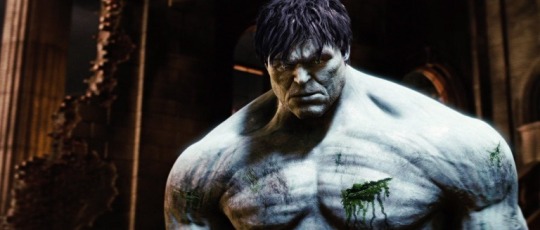
What makes this ending so particularly bad is how out-of-place it is in the rest of the narrative. Yeah, we 100% EXPECT a Boss Battle at the end, because that’s the formula for these things, but the movie does a really awkward job of not actually building up to that climax in a meaningful way that lets it feel earned rather than perfunctory. Let’s rewind; the premise of the whole film is that Bruce Banner is trying to keep his Hulky genetics out of the hands of the military, specifically a program overseen by General Ross, who happens to be the father of Bruce’s former co-worker/lover Betty, because of course he is. This detail is not actually important for any reason, it’s just an excuse for Bruce and Ross to conflict over Betty like she’s a cool shiny object, because ultimately she has no more narrative function than Martina the hot Brazilian chick. Anyway: Bruce is on the run from Ross, Ross is on the hunt for Bruce so that he can experiment on him forevermore, and Betty is there sometimes to say Bruce’s name as a question. Ross chases Bruce with lots of army guys, Bruce Hulks out at various points so that the action sequences can involve more than Edward Norton running away, and there’s a long-term goal for Bruce in the form of getting some Science to another Scientist so that they can Science a cure for his Hulky genes and he can stop running once and for all (it doesn’t work). It’s not a very inspiring script. It’s fairly straight-forward and predictable, but there’s nothing especially bad about it other than the pointlessness of Betty (the same as this is a front-runner for the MCU’s worst film so far, Betty is a strong contender for Worst Inclusion of A Useless Love Interest). Norton may not be a great Bruce Banner, but he does a solid job of giving weight to Bruce’s plight, and the overall effect is at least passable as a film, if forgettable. The problem here is Emil Blonsky, the marine tasked by Ross to head the operation to capture Banner, and the man who eventually becomes the Abomination whom Hulk battles in that cringe-worthy film climax. And the problem with Blonsky is not that he’s some kind of weak link in the script. The problem is, he’s the best character in the movie.

Maybe it’s just that Tim Roth is too good for the material (he is), but Blonsky is easily the most dynamic person in an otherwise flat film, and he’s the only character whose narrative arc isn’t instantly predictable the moment he steps on screen. He’s a consummate soldier, all about the job, and getting into the thick of things himself to make sure it gets done right. His road to becoming Abomination begins partway into the film, as Blonsky grapples with the aftermath of his first encounter with the Hulk - for which he was brutally unprepared due to Ross’ failure to provide essential mission intel - which led to the death of many of Blonsky’s men. As Ross comes clean about the super-soldier serum experiments that created the Hulk, he plucks at a few delicate nerves, noting the physical toll that years of service have taken on Blonsky’s body. Blonsky laments that he can’t take the experience he has now and put it into the body he had a decade ago; Ross suggests that, maybe, they can arrange something kinda like that. It isn’t played as outright manipulation - Ross has just told Blonsky that there were other experimental treatments in the same line as Banner’s work, and Blonsky knows what conversation they’re really having and has already seen what the side-effects could be if it goes badly - but there is plain prompting from Ross, to say nothing of the treatments he then actively facilitates, most notably the second dose which he offers despite having originally stated that if Blonsky experienced any adverse effects (which at that point he has, in limited capacity) the treatments would cease. It’s a situation in which Blonsky rapidly loses his agency, and for which Ross isn’t even a little bit blameless. What’s significant about this is not just that Ross is the ‘villain behind the villain’ in this case, but that Blonsky really...isn’t a villain in the first place.

Now, ‘villains’ in stories (and especially comics) who start out innocent/unlucky/well-intentioned and then become twisted are not uncommon, but the key to making those narratives work is that the story acknowledges the pathos of that journey; that this person never meant to end up as the villain, and it’s a sad turn of events that brought them down that road despite themselves. This is where things fall apart for this movie, because they kinda, oops, forgot to either (1) make Blonsky’s pre-serum behaviour clearly villainous, or (2) match his unwilling descent into villainy with a tone of empathy and regret for how his character has been turned astray. He isn’t presented as some paragon of goodness to be torn down, but he also doesn’t act maliciously or imply that he draws sadistic pleasure from his work. He consents to that first dose of serum, but it isn’t for evil reasons, he’s not bloodthirsty, he’s not going after the Hulk as a personal vendetta: the primary emotional motivation he displays is curiosity. He wants to get the job done, and he recognises the threat that Hulk represents, and he’s interested in finding out exactly what kind of a world he’s just been looped into. He may be antagonistically positioned against the protagonist of the film, but his intentions aren’t reprehensible from any angle. Thing is, the serum he takes is depicted as having a narcotic effect, impairing his judgment and fostering an escalating addiction that ultimately creates the Abomination; it’s all downhill for Blonsky after that first dose, the situation spins wildly out of his control, and he loses himself in the process. This is where the pathos should fit in as an essentially good (or at least neutral) person is lost to this drug, but it doesn’t. Instead, Blonsky becomes Abomination for the final act of the movie, and all of his characterisation evaporates so that he can just mindlessly smash things for no apparent reason. If he had been shown to be someone who engages in unnecessary violence and/or enjoys it at some prior point, then Abomination would be an escalation of existing villainous predilections, and it would work, but that isn’t the case. Where Hulk operates off an established base of anger/raised heart-rate/physiological response to heightened situations, and his destructive tendencies and absence of higher cognitive functions make sense in that context of reactionary hind-brain behaviour, Abomination has no established parameters or reasons for developing as he does, and searching the only information we have - Blonsky’s characterisation - for answers turns up no satisfactory results. Abomination’s rampage has nothing to do with ‘getting the job done’ (Banner is in Ross’ custody by that point in the film, in fact, so the job is already done), nor does it have anything to do with the Hulk himself - Blonsky and Banner never had specific personal beef with one another that would make a final confrontation meaningful (Bruce doesn’t even know who the Abomination is/was) - so Abomination’s entire existence feels pretty pointless. It’s just there so that Hulk can pick on someone his own size.
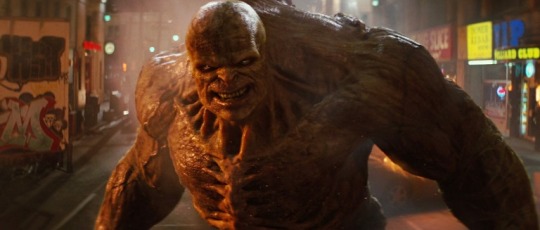
The final fight scene is objectively bad from a technical standpoint, with the dodgy CGI and the way-too-corny contrivances and the muddy uninspired visual mess of it all: it’s just plain bad to watch, but it is also not only devoid of emotional relevance or weight, it’s devoid of emotional logic. We’ve watched this process of Blonsky ‘becoming a monster’ in a literal sense, and it’s been the only part of the movie with any life in it (it’s not a deep well of complexity, but again, I think it works because Tim Roth is fucking making it work), but a boss fight is not a fulfilling conclusion to that narrative because we haven’t been given clear stakes in the outcome. Considering that Blonsky ends up a victim of Ross much the same as Bruce Banner is, it really should be Ross’ villainy that is ultimately defeated to bring us a satisfying conclusion, but the film forgets its own narrative in the course of pretending that Blonsky was the main bad guy all along, to such an extent that it bizarrely turns around and rewards Ross in the end. After transforming into Abomination, no one so much as suggests that Blonsky is still in there somewhere (his name is not even mentioned), he’s just a beast-creature now, and Ross gets to keep him and do all that fun experimenting that he wanted Hulk for this whole time, and no one challenges the idea. Remember how the whole movie was about Bruce trying NOT to get caught and experimented on forevermore by the military? Remember how that’s supposed to be a bad thing that Good Guys want to stop? Eh, who cares? Apparently not Bruce Banner, whose upstanding morals don’t extend far enough to want to save anyone else from the fate he has thwarted for himself. Not very heroic, just kinda leaving some other dude to take your place. As hardcore as Bruce was about keeping the formula out of Ross’ hands, etc, apparently he has no qualms about this derivative, and he just whistles on out of there, and that’s it. The end. Not a second thought for Blonsky’s fate, no fulfilling closure for Bruce’s ACTUAL villain beef with Ross, the bad guy gets what he wants and no one cares, the good guy completely forgets the ideals that he was fighting for the entire time and therefore kiiinda renders the whole journey of the film pointless, and worst of all, there’s no sense that the story comes to these conclusions deliberately, that it’s supposed to be off-kilter in any of these ways. It’s like they got to the final act and literally forgot everything that had happened in the film previously so they just stopped without actually closing any of the storylines, it’s a totally incongruous ending.
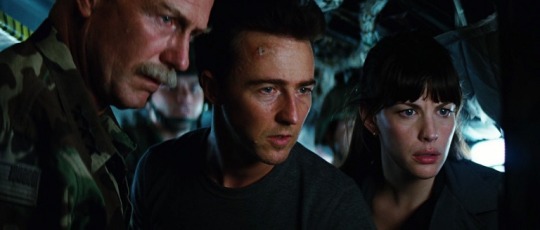
I’ve focused largely on how much they screwed over Blonsky in this process because I considered him the film’s saving grace the rest of the time, but really, the ending screws over every character, theme, and narrative thread in the whole story, and that’s the huge disconnect that leaves the audience remembering a bad film, not just a bad ending. Granted, it wasn’t a good film to start with, and if you were less engaged with Blonsky than I was and you didn’t latch on to one of the other slim elements the story offered instead, then the whole thing turning to shit in the end really can’t have been much of a loss. It’s not that they didn’t, at moments, have the makings of something that might be good, or glimmers in scenes that suggested a quality idea that might have shone if someone had polished it a little better. For anyone reading this and going ‘well, don’t you know they had loads of behind-the-scenes issues with redrafting the script and other bullshit?’, yes, I am aware of that. Thing is, it shouldn’t matter. A 150-million dollar major Hollywood franchise project doesn’t get to use ‘oh, we just didn’t really bother making sure the script made basic sense before we filmed it’ as a valid excuse. If everyone’s doing their jobs properly the way they should be at this level of the industry, then the audience shouldn’t be able to see your BTS issues bleeding all over the finished product; major script redrafts should be a Did You Know? trivia point, not an ‘oh, NOW I get what went wrong here’ explanation. At the end of the day, no one cared enough about making this a movie that would matter in the long run for an expansive Cinematic Universe. Tanking the whole film into a forgettable mistake that viewers would gladly leave out of their Marvel marathons was, ultimately, the one thing they did successfully.

8 notes
·
View notes